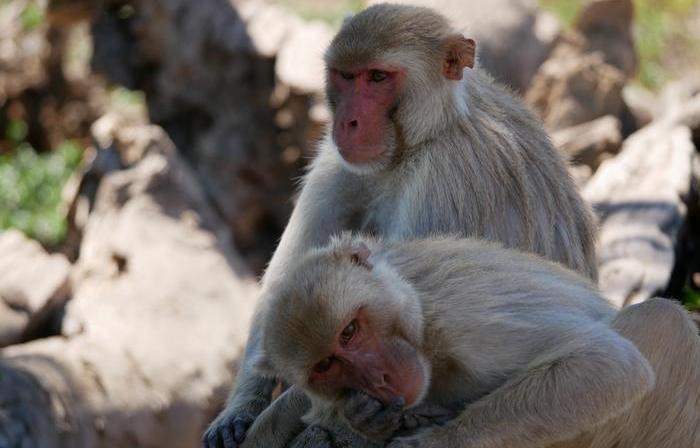A three-year study of a semi-wild monkey colony has revealed that most male macaques engage in sexual behavior with other males, and indeed it’s more common for males to mount other males than females.
Same-sex sexual activity has been reported in hundreds of animal species, repeatedly refuting the “it’s not natural” trope. However, these observations are usually anecdotal, providing little information about how common it is for creatures to get it on with their own sex when prejudice doesn’t get in the way.
A new study addresses this for rhesus macaques living on Cayo Santiago island, Puerto Rico. The macaques’ privacy was sacrificed for science, with researchers logging each time the males engaged in sexual behaviors and whether it was with females or other males. The behavior was compared with paternity rates to see whether there were any downsides to expending all that energy on activity with no apparent reproductive benefits.
The team studied 236 male monkeys out of the 1,700 on the island. They not only recorded their activity but used the family tree, recorded since 1956, to determine genetic relationships and how many offspring each macaque fathered.
“We found most males were behaviorally bisexual, and that variation in same-sex activity was heritable,” said study author Dr Jackson Clive of Imperial College, London, in a statement. “This means that the behavior can have an evolutionary underpinning; for example, we also found that males that mounted each other were also more likely to back each other up in conflicts.”

Macaques just want to have fun and same sex activity is a big part of that.
Image Credit: Chloe Coxshall
Same-sex behavior (SSB), involving one macaque mounting another was recorded among 72 percent of the sample. Only 46 percent were seen mounting females. Contrary to some predictions, SSB was not more common in subgroups with an uneven sex ratio. The largest portion of the study sample engaged in both, but both having exclusively SSB and no sexual activity at all were more common than only mounting females.
Around 10 percent of the SSB the authors witnessed occurred after aggressive interactions, but it was more commonly accompanied by other friendly interactions such as mutual grooming. In some cases, a pair of male monkeys would unite to direct vocal threats at a third party while mounting each other.
Plenty of armchair experts will tell you SSB is bad for reproduction –yet the authors found males who mounted other males had more offspring than others. They think that conflict support may be the key to this – if SSB creates a bond that proves useful when threatened, having a boyfriend who will back you up could increase your prospects of mating with a fertile female.
Looking back, the team found SSB in macaque males is 6.4 percent heritable. That figure may sound low, and is less than the 8-11 percent one study found in humans, but it’s the first evidence for a genetic component outside humans. It’s also similar to the heritability of more widely studied, and obviously beneficial, behavior such as grooming and sociability.
In another contradiction of human prejudices, the authors found no correlation between position in the hierarchy and whether a monkey was usually mounted or doing the mounting.
Early biologists, influenced by prejudice against human homosexuality, tended to ignore examples of SSB in animals and describe it as deviant when they couldn’t. Consequently, examples that have been reported have gained political significance. The discovery of a high incidence of pairs of female seagulls raising their young together off California made lesbian seagulls symbolic in the defeat of homophobic legislation in the 1970s, inspiring a surprising hit song. The seagull study, however, was unusual in providing numerical data, not just reports SSB had been seen.
Rhesus macaques come from Asia, but those transported to Cayo Santiago in 1938 thrived in the absence of predators. The colony’s defined boundaries have made the location a drawcard for primatologists. Last year, for example, a study revealed that residents of the island with stronger social ties have healthier gut bacteria. The extra grooming these friendlier individuals engaged in is thought to have paid off by transferring beneficial microorganisms. Perhaps the same goes for same-sex shagging.
It’s not all sexy times and blissfully doing each other’s hair on “monkey island”, however. After a major hurricane in 2017, the macaques’ immune systems were found to have undergone accelerated aging.
The study is published in Nature Ecology & Evolution
Source Link: Bisexuality Is The Norm Among Male Rhesus Macaques